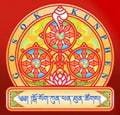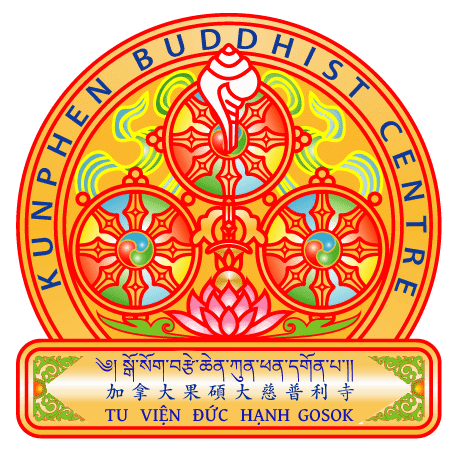怙主果碩仁波切講授
大乘佛教修行
修持大乘佛教的行者,心中均有「為利眾生願成佛」的大願,欲成就圓滿佛果,必須同時具足圓滿的智慧與福德資糧,此二者須依靠行者修持空性正見慧與菩提心而來,而欲證得空性正見慧必須生起具量的出離心;欲生起廣大的菩提心首先須認知輪迴痛苦的本質,因而發願欲救度有情眾生能離苦得樂,此仍須以出離心為基礎。出離心又可分為斷除對此生的貪著與厭棄對來世的貪著;因此,推溯一切道次第修持的根源,均須斷除對此生的貪著。由於行者能斷除對此生的貪著,來世能往生人天善趣;由於厭患對來世的貪著,精進修持戒、定、慧三學,能證得涅槃解脫;由於發起「為利眾生願成佛」的大願,精進修持菩提心與空性正見慧,終能成就圓滿佛果。
暇滿人身
行者由於未能了知具足八種閒暇、十種圓滿的人身,是何等殊勝、難得與具足極大的義利;及應當運用此人身達成何種目標?因而不斷地虛耗光陰去追求名聲、財富與衣食享受。如同乞丐不知將自己所擁有的金銀財寶用以改善生活,依然四處行乞,過著窮困潦倒的日子;此生若未能珍惜暇滿難得的人身,繼續放任寶貴的生命不斷流逝空過,則來生必定繼續於輪迴的大海中漂流不止。
思惟「暇滿」的內涵,能令行者避免將寶貴的生命浪費在無意義的作為之上;思惟「難得」的內涵,則可令行者把握此生難得的機緣,精進修持正法,從而獲致解脫乃至成佛。
六道有情眾生的數目不可盡數,其中更有無量無邊的眾生墮入三惡道之中,相形之下,行者此生能獲得暇滿難得的人身,其殊勝自不待言!
「暇滿」一詞中,「暇」意指八種閒暇【遠離八種無暇—未能值遇佛法、諸根不具、具邪見、邊地受生(以上為生而為人的四種無暇)、生於地獄道、惡鬼道、畜生道、長壽天】。
自圓滿
「滿」意指十種圓滿,其中包含「自圓滿」與「他圓滿」各五種;自圓滿的首要條件即生而為人,因人較其他有情眾生具有更為殊勝的因緣。
自圓滿的第二種條件為「生於中土」,中土之意有二:依地域區分、依佛法區分,此處係指以佛法區分之中土,行者若投生於持守戒律的四眾佛弟子【比丘(沙彌)、比丘尼(沙彌尼)、優婆塞、優婆夷】所在之處,並有法師宣說經、律、論三藏,或修持戒、定、慧三學之地,即為生於中土。
自圓滿第三種條件為「諸根具全」,諸根具全除身體各種感官與肢體均須健全之外,尚須非中性人(身體同時具足男根與女根)方可,此因中性人不能接受任何一種別解脫戒,是故,不能成為「諸根具足」的人身。
自圓滿的第四種條件為「不墮邊業」,意指未曾造作五無間罪【弒父、弒母、弒阿羅漢、出佛身血、破和合僧(挑撥離間使僧團產生紛爭)】,經典中曾提及:「此生若曾造作五無間罪,即不能證得阿羅漢以上的果位。」況且造作五無間罪乃是與追求涅槃解脫的目標背道而馳,因此,若曾造作此等惡業,即不能成為具足圓滿的人身。
自圓滿的第五種條件為「信解勝處」,就辭意而言,「勝處」意指戒律,行者對戒律具足虔敬的信仰,即為「信解勝處」。持守戒律的目的可區分為二種:一、遠離墮罪(牽引行者墮入三惡道的罪業)。二、止息煩惱。以遠離墮罪作為目的而持守戒律,僅須對戒律具足虔信並努力持守即可;若就止息煩惱而言,則須修學經、律、論三藏,方能達成目標。此處係以對經、律、論三藏具足虔信而修學,為圓滿「信解勝處」之條件。
欲修學正法從而獲致解脫,除須具足八種閒暇之外,尚須具足十種圓滿,如此方能具足圓滿修學正法的條件,行者應努力使自己具足上述五種自圓滿的條件。
他圓滿
他圓滿的五種條件為:一、佛出世。二、說正法。三、教法常住。四、為法隨轉。五、他心所悲憫。此依無著菩薩所作的「菩薩地分」而說。「佛出世」意指行者出生於佛陀住世尚未涅槃的時代。「說正法」意指佛陀除住世之外,尚開示殊勝的教法,十方三世諸佛於成佛後,並非均具有宣說佛法的因緣。「教法常住」意指世間仍有佛陀所宣說的教法存在,尚未衰滅,且仍不斷地流傳與弘揚。「為法隨轉」意指行者有緣能值遇修行精進具足成就的上師或法師,了知藉由修持佛法能獲致解脫成佛的殊勝利益與功德,因而發心皈依受持戒律乃至出家修行。「他心所悲憫」具有二種意涵—一、具足教證功德的上師或法師們,為使行者能獲致解脫,將各種修持的心要與口訣,毫無保留地授予行者。二、信眾能發心布施飲食、醫藥等各種資具,護持行者能專心修行。
珍惜難得暇滿人身
世間的人們常不知珍惜此生所具有暇滿難得的人身,未能妥善運用自己所具足諸如世間財富等種種圓滿,幫助他人得以遠離痛苦獲得安樂,從而累積智慧與福德資糧,使其成為自己修行乃至獲致解脫成佛的助緣;反而因為擁有財富而引發自身強烈的貪、瞋、癡,將大部分寶貴的生命,用於謀取自己及親人的利益與打擊敵人之上,然而這些以「愛我執」為動機,所造作的各種行為中,絕大部分皆為惡業,如此深重的惡業,導致行者須承受無量無邊的痛苦,所具足的圓滿反而成為獲致解脫成佛的障礙,如此,甚是可惜!
如同一帖藥劑須將藥單上所列的各種藥材齊備,服用後,方能發揮預期的效果。吾人此生已具備八種閒暇與十種圓滿等十八種獲致解脫成佛的寶貴條件,若仍不能善加珍惜如此殊勝難得的人身,依然繼續蹉跎歲月,則將如「入菩薩行論」所形容不知珍惜暇滿難得的人身,其行徑如同瘋子一般,愚癡莫此為甚!
經典中對於人身難得有如是譬喻:「有一隻盲龜(行者)身處大海(生死輪迴)的海底(三惡道),每一百年方浮出水面一次(於三惡道中長時受苦,業盡暫得出離且獲得人身),海面上有一金色牛軛(佛法)中有孔穴,隨海浪漂流,盲龜於浮出水面的一刻,恰巧將頭伸入牛軛的孔穴之中。」人身的殊勝難得與佛法的難值難遇,由此可知,行者對於此生能獲得暇滿難得的人身,應善加珍惜!
行者未聽聞佛法之前,或許認為人生僅須求得此生的圓滿與安樂即可,不須耗費心力修持正法;此為障礙行者修行的第一種邪見。此種錯誤的認知,於行者聽聞佛法,了知暇滿難得的人身所能成辦的殊勝義利(例如能往生人天善趣或淨土,乃至獲致解脫與成就圓滿佛果),並於心續中生起證量之後,將能逐步減輕,乃至完全斷除。
有情眾生莫不具有希求安樂與厭離痛苦的共同點,然世人卻常將此生具足財富等圓滿,僅供自己受用,吝於布施行善;因此,雖然極力追求安樂,卻仍以此慳吝的果報,來生將墮入餓鬼道,而與獲致安樂的目標有天壤之別。
行者或許會墮入輕視自己,認為自己沒有能力修行,無法藉由修行而獲致解脫乃至成佛,此為障礙行者修行的第二種邪見。所有的天人於壽命將盡之時,無不發願來生能獲得可即身成佛的人身,天人尚且如此發願,行者更不應妄自菲薄,應當對於藉由精進修持正法終能獲致解脫乃至成佛的義理,生起堅定的信心。
修行能否有所成就?關鍵在於行者的心續能否藉由修持,將原先錯誤的認知乃至種種煩惱惡習予以徹底轉變,若能將其轉變甚至革除,即能生起各種道次第的證量;因此,修行能否有所成就?取決於能否將上師所講授的教法付諸實修,從而使煩惱與業障逐步減輕。心續中能否生起各種道次第的證量,與行者的年齡、財富與地位沒有任何關聯。
暇滿人身三種因緣
行者雖然了知修行的重要,然卻不斷地藉故推延,總是認為將來有時間再努力修行,此為障礙行者修行的第三種邪見。欲對治此邪見,行者須思惟與修持暇滿人身極為殊勝難得。「菩提道次第廣論」中,分別從因緣、本質、譬喻等三方面說明人身難得,欲獲得暇滿人身須具足三種因緣:
一、清淨持守戒律—月稱菩薩於「入中論」一書中即強調欲獲得人身須清淨持守戒律,清淨持守戒律為往生人天善趣必要的條件,然而觀諸社會大眾有多少人能持守十善戒?(不造十惡—殺生、偷盜、邪淫、綺語、兩舌、惡口、妄語、貪、瞋、癡)即使行者已受持別解脫戒、菩薩戒與密咒戒,捫心自問自己是否已能清淨持守戒律?因此,不應將清淨持守戒律一事,認為無甚艱難而等閒視之。
二、具足六度等善行—藉由清淨持守戒律能獲得人身,然若未能同時具足暇滿的條件,則仍有缺憾,此缺憾唯有依靠布施等善行方能彌補,進而獲得暇滿人身;藉由布施能增長福報、持戒能獲得人身、忍辱能具足威儀、精進、禪定與智慧能幫助行者趣入正法。
三、清淨的願心—清淨的願心最低限度須發願來生能往生人天善趣,最究竟的願心則為「為利有情願速成佛」,行者若將所具足的六度善行,發願能獲得此生的富樂圓滿,此種以「愛我執」為動機的願心具有染污與不清淨,容易將此生行善所累積的福報,輕易加以揮霍甚至造作惡業,來生必然難以再獲得暇滿人身。
上述三種因緣極難同時具足,行者由於長時於輪迴中流轉的緣故,心續中貪求此生圓滿富樂的習氣已然根深柢固,任運生起的種種心念,莫不是希求自己能遠離病苦,具足財富、權勢與名聲,縱使已皈依佛門發心修持,此種具有染污與不清淨的心念,仍然經常產生;行者雖不斷發願能往生人天善趣乃至獲致解脫成佛,然仔細反省自己每天的心念與行為,卻仍是惡多善少,不斷的造作與累積墮落惡趣的因,如此顛倒的觀念與行為,如何能圓滿行者的心願;因此,須時時省察自心,將錯誤的意念與動機加以修正,切勿繼續受其左右,障礙行者往生人天善趣乃至獲致解脫成佛的因緣。一旦行者能使自心產生轉變,將惡習逐步淨除,即能漸次生起各種體悟,這些體悟能使行者獲得安樂與自在,從而堅定行者精進修行的心念。基於以上所述可知,暇滿人身極為殊勝難得,此生若未能修持正法,來世再獲得暇滿人身的機會,可說微乎其微。
以上所述為闡釋暇滿人身難得的因,行者對此若能殷重觀修,並生起深刻的體悟,則對於本質與譬喻兩者,將能迅速生起覺受。
從數量與時間說明暇滿難得
暇滿人身難得的本質可從數量與時間兩方面加以說明:
一、數量—墮入惡趣的有情眾生以地獄道有情眾生的數目最多,次為餓鬼道,次為畜生道,而畜生道有情眾生的數目又遠大於人的數目。佛陀住世時,某次,曾當著諸聲聞弟子面前,從地上抓起一把塵土,然後詢問弟子們:「我手中的塵土比之大地所有的塵土,其差別如何?」弟子們回答:「其差別為百千萬億倍乃至算數譬喻所不能及。」佛陀如是開示:「能往生人天善趣的有情眾生數目,如同我手中的塵土;而墮落三惡道的有情眾生數目,則如同大地所有的塵土。」既能往生人天善趣又能同時獲得具足暇滿人身的有情眾生,則更為稀有難得!
二、時間:於無盡的輪迴流轉的過程中,有佛陀出世的大劫稱為「光明劫」,沒有佛陀出世的大劫稱為「黑暗劫」,黑暗劫的數目遠多於光明劫,每一大劫又可分為成、住、壞、空各二十個中劫,即使於光明劫中,佛陀僅於住劫時,方具足降生世間之因緣,而佛法住世的時間約僅數千年之久;因此,行者能於光明劫中生而為人並能值遇佛法,其殊勝難得自不待言!
此生既能獲得如此殊勝難得的人身,若仍繼續浪擲於追求此生安樂與打擊敵人之上,其愚癡將有如畜生一般,此乃因為某些畜生於這方面所具足的能力,尚且勝過人類,而獲得具足暇滿難得人身的人們,卻繼續從事與畜生無別的愚癡行為,此乃極為荒謬之事,如是觀修能促使行者斷除藉故推延不肯修行的邪見。
障礙行者修行的第四種邪見,乃是行者欲將世俗的各種願望與目標圓滿達成之後,方願意投入修行的行列。欲對治此邪見,行者須觀修死無常的意涵,了知生命終將結束且死期無定的義理,從而斷除此邪見。
上述四種障礙修行的邪見,於行者對人身暇滿難得的意涵,尚未生起深刻的體悟之前,經常容易產生;因此,行者須不斷深入思惟與修持人身暇滿難得的意涵,從而斷除此四種邪見,使行者所修持的任何教法均能成為清淨的正法,所從事的任何修行均能成為清淨的修行。
行者須深入思惟,若此生投生於八種無暇之中,境遇是何等悲慘,並且無法從輪迴無邊的痛苦中解脫。人的一生可以一日的時間為例加以說明:清晨醒來即是出生,早上至中午為成長乃至中年的過程,中午至晚上即為中年步入衰老的過程,當夜晚來臨即面臨死亡。行者如是思惟:我於一日(一生)之中,認真修行的時間有多少呢?
如法精進實修
若能善加運用每一天的時間,如法精進實修,則此生的修持必能趨於圓滿。
每天清晨醒來時,可觀想面前虛空有自己的根本上師,周圍為無數的十方諸佛菩薩所圍繞,上師的本質與諸佛菩薩無二無別,行者思惟暇滿人身極為殊勝難得,此生若投生於八無暇之處,將承受巨大的苦楚且無緣聽聞與修持佛法;例如,投生地獄道的眾生,四周均為烈火與炙熱的油鍋所圍繞,空中復有無數的火球與箭落下,獄卒不斷地以熔化的鐵汁與炙熱的火球灌入眾生的口中,並以炙熱的鐵叉刺穿眾生的身體,且因其皮膚如同嬰兒一般嬌嫩與敏感,受此烈火燒炙之苦與各種慘酷的刑罰,其痛苦為言語所無法形容,如此令人怖畏的痛苦即使僅經歷一剎那,行者亦無法承受,遑論受苦的時間長達數劫,身處如此巨大的痛苦中,絕無閒暇能聽聞與修持佛法。
其餘投生八無暇處的悲慘景況,如經典與「菩提道次廣論」所述,地獄可分為熱地獄與寒冰地獄各八種、乃至投生餓鬼道與畜生道所須承受的種種難以忍受的巨大痛苦,即使生而為人,卻身罹盲殘瘖啞、智力不足、心神喪失等諸根不具,生活起居尚須仰賴他人照料,身處此種境地,如何能聽聞與學習佛法呢?甚至雖生而為人卻具有邪見(人的四種無暇中,過患最大的一種),受邪見的牽引,不斷地造作極大的惡業,導致自己終將承受無量無邊的痛苦;行者如是觀修,使自己對地獄道乃至各種無暇之處生起極為畏懼的感受。對此生能獲得暇滿難得人身且能信仰與修學佛法,深覺慶幸與倍加珍惜。心中生起堅定的心念:一定要運用此暇滿難得人身,精進修持正法,勿讓此生空過,而使來世投生於無暇之處!
祈請上師諸佛菩薩加持
如是祈請上師諸佛菩薩加持,使自己的心念轉變從而生起感動、體悟與覺受,然後觀想上師與諸佛菩薩由頂輪進入自身,使自己的心續獲得殊勝的加持,如是觀修能使心續中生起各種道次第的證量,對行者具有殊勝的利益。
一切修持係以「如理依止善知識」為道前基礎,行者於一天開始的清晨,作如是觀修,將能使一天的起心動念逐步趨於正法。唯能否獲得加持的關鍵,在於行者能否轉變自己的心念從而產生體悟,若僅止於口頭唸誦,將無法獲得真正的利益,對於各種道次第證量的生起亦將毫無助益!
行者可藉由獲得暇滿難得人身,精進修持正法,從而獲致解脫乃至成佛;亦可以此暇滿難得的人身造作惡業,繼續於輪迴中漂流乃至墮入惡趣。同樣獲得人身卻因能否善加運用而導致結果有天壤之別,其中的利弊得失,行者須仔細思惟。
於無數次的輪迴中,行者曾經生為天人的次數不知凡幾,榮華富貴的享受更是不可勝數,然而今日卻仍沉溺於輪迴中無法解脫;因此,不應再將寶貴的人身,浪擲於追求榮華富貴之上。況且此生除具足暇滿難得的人身之外,尚能具足因緣皈依佛門、聽聞正法與修持,自當努力使自己能獲致解脫乃至成佛,切勿使此暇滿難得人身變成如船錨一般,將自己牢牢地固定於輪迴大海之中,不得出離。
http://www.kunphen.com/html/2010/gljy_0723/104.html


